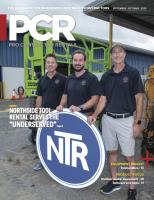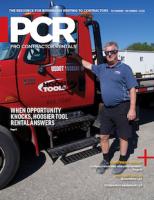Build Your Business -- Know because you know
Market research helps identify unmet customer needs. Here’s how to do it.
Market research is the process of gathering information about your customers, competitors, markets, trends and related information. There are several options for gathering information about customers, their buying preferences and purchase intentions. Market research is increasingly important in the construction industry where economic trends influence the outlook for the industry. Following are tips collected by the Construction Marketing Association.
Why do market research
|
MARKET RESEARCH TIPS The construction contracting industry is a challenging target for marketing research. The very nature of their jobs means they are not likely to be sitting in front of a computer waiting to take a survey; they are out on the job site and working long hours. However, there are ways to reach contractors for marketing research projects. Here are nine proven tips from Symmetric, a sampling service that manages online panels that gather marketing information. 1. Rely on the experts. Make sure your market research partner has experience completing a variety of market research projects with contractors. You may need to get creative to complete your project; a partner who has been there/done that can be beneficial. 2. Consider multi-modal research. For very low-incidence or tough-to-find audiences such as specialty contractors, combine email or phone efforts with an online survey. Mailed surveys may work well with contractors. 3. Be creative in sampling. Using a dedicated contractor panel is a good way to get statistically significant data, but you may need to use other methods. Consider buying a list from a trade magazine or association. Consider going directly to the job site to find respondents to complete the survey. 4. Multilingual is required. Not every respondent will be able to complete a survey or interview in English. Offer Spanish as an option in all cases; regionally you may need to offer other languages as well. 5. Give them time. Completing your market research is not their top priority, so allow for longer field time. Include one or two weekends as contractors may be better able to respond then. 6. Be aware of seasonality. In many parts of the country, contractors are busiest in the summer; in other parts of the country, they work year-round. Think about the timing of your project. You will get a better response with more thoughtful answers if you field your project at a less busy time of year. If you need to survey groups during their busiest times, plan on giving them more time to respond. 7. In-person research works great. Most contractors are very interested in tools and equipment, especially new tools. Getting to them one-on-one in equipment or tool trials works well. Meet them at a central location and talk about the tools or other products in which you are interested. Let them try the tools or equipment, then interview the contractors about how it compares with other tools and equipment they use or have used. 8. Open the funnel. Many contractors move fluidly between job categories. General contractors tend to be Jacks and Jills of all trades. So, while they may specialize in one trade, they may be perfectly qualified to talk to you about many other areas. 9. People know people like themselves. Ask your respondents to refer you to other people who could help you with your project. Moving between job sites, contractors regularly meet other people like themselves and, for the right incentive, are willing to make those introductions. At the end of the interview, ask them to refer others. Although market research with contractors is challenging, it can be done and can deliver important and insightful results. Just because it is difficult does not mean you should not attempt it. Symmetric Sampling has more than 20 years of experience completing market research through its Contractor Advisory Board panel. |
Market research can support planning and budgeting and decision making for new products. It can also find out if it makes sense to expand into new lines or areas. It can be used to fine-tune marketing communications and develop customer initiatives. Marketing without research, customer or market insight is guesswork, with a high risk of failure.
However, niche markets within the construction industry likely do not have available secondary research, so they require primary research.
Types of market research
There are many types of market research, often categorized as primary vs. secondary research, quantitative or qualitative research, and syndicated research.
Secondary research is the most common. It is published, publicly available and free information from websites, magazines and publications, trade associations, government, census data and search engine results.
Primary research is information collected directly from the source, often custom to the project and typically includes surveys, interviews and focus groups.
Qualitative research uses open-ended responses, typically with interviews or focus groups. On the other hand, quantitative research employs statistically significant sampling and closed-end questions and is typically gathered with surveys. Surveys are more convenient than ever with the ability to utilize online surveys such as SurveyMonkey, eSurveysPro, FreeOnlineSurveys.com, SurveyFactory and Crowd Signal.
Syndicated research is conducted by a research firm and sold to several users on a fee or subscription basis; Dodge Analytics and ConstructConnect are examples of syndicated research relevant to the construction industry. Some other types of research include competitive intelligence, customer satisfaction, brand awareness/equity/preference, positioning, segmentation and more.
Step by step
HubSpot provides some great tips for conducting market research in the construction industry.
Getting started. Determine what type of information you need about your business and the construction market. Perhaps you want to launch a new product or service for your business or you may want to know why potential clients don’t seem to know about you. Make market research goal-oriented by setting objectives and a timeline.
Don’t research what’s already been done. Don’t reinvent the wheel when some of the information you want is yours for the asking. Review business information provided by your local media. You may gain insightful information and new leads for information at the same time.
Read or watch national media to learn about the global construction market. For example, homebuilders can gain access to residential construction market information through membership in builders’ organizations such as the National Association of Home Builders (NAHD).
Fill in the information gaps. After gathering relevant information from other sources, look for gaps in the information you still need. Chances are this is the subjective information, also known as qualitative data, that comes from people’s opinions.
Decide on the best research methods for gathering this information. Questionnaires and surveys are inexpensive ways to gather information about the building construction market.
Analyze the data. Once the data is collected, find a way to organize the results to provide the information you need. Focus on consistency and quantification. Twenty people making a similar statement is a stronger result than the opinion of one person. Make conclusions from tabulated results.
---------
This story originally appeared in the September-October 2022 issue of Pro Contractor Rentals magazine. ©2022 Urbain Communications LLC. All rights reserved












